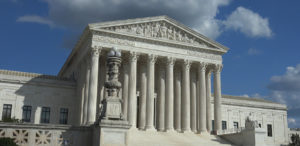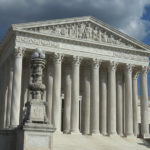The U.S. Supreme Court heard arguments Oct. 6 that people whose rights under the Religious Freedom Restoration Act have been violated should have access to the same legal remedies—including monetary damages—as those protected under other federal civil rights laws.
The case before the court, Tanzin v. Tanvir, deals with whether three American Muslims can seek damages from two dozen government agents.
The men—Muhammad Tanvir, Jameel Algibhah and Naveed Shinwari—alleged the FBI placed them on the No Fly List because they refused to serve as informants and spy on fellow Muslims, which would violate their faith.
The men eventually were removed from the No Fly List, but Tanvir asserted he had to quit his job as a truck driver because he could not fly home after making long-distance one-way deliveries. For an extended time, he also was unable to visit his ailing mother in Pakistan.
Meaning of ‘appropriate relief’ debated
Specifically, the case focuses on a statutory question regarding what remedies are available as “appropriate relief against a government” under RFRA. The 2nd U.S. Circuit Court of Appeals held “appropriate relief” can include monetary damages.
The federal government—defending the FBI agents—argued RFRA does not allow for monetary damages and permitting it would open the floodgates to lawsuits against government officials.
“‘Appropriate relief’ for civil-liberties violations has always included damages against officers, and RFRA is no exception,” according to a friend-of-the-court brief filed by the Baptist Joint Committee for Religious Liberty.
The BJC, along with the Christian Legal Society and others, filed the brief arguing RFRA always was intended to allow for monetary damages.

“The Religious Freedom Restoration Act, like other civil rights laws, is intended to hold government accountable for the protection of fundamental rights,” said BJC General Counsel Holly Hollman.
Sign up for our weekly edition and get all our headlines in your inbox on Thursdays
“In most cases where a violation is proven, the remedy will be for the government to reverse course. In some cases, however, monetary damages against individual government actors are appropriate and should be available to address the harm of a violation.
“We joined a brief with the Christian Legal Society and experts in religious liberty and remedies law that focuses solely on the statutory question in this case. The Supreme Court should affirm that RFRA was always intended to allow for damages under the same principles that are followed elsewhere in federal law protecting important civil rights.”
Brief explores history of RFRA
The brief, written by church-state scholar Douglas Laycock, who holds endowed chairs at the University of Texas and the University of Virginia, explores the legislative history of RFRA. The BJC chaired the Coalition for the Free Exercise of Religion that persuaded Congress to pass RFRA.

“Congress often explicitly excludes or limits damage remedies, especially in statutes authorizing litigation against government defendants,” the brief argues. “Given the long history of damage remedies for civil-liberties violations, Congress would have excluded such remedies if that were what it meant.”
The brief also refutes the idea that RFRA only authorizes relief against government, not against individual actors. RFRA “expressly defines government officials and persons acting under the color of law as government,” the brief states. The term “under color of law” refers to individuals who may be sued in a personal capacity for actions performed in an official capacity.
The Supreme Court originally was scheduled to hear oral arguments regarding Tanzin v. Tanvir in the spring, but it was rescheduled due to the COVID-19 pandemic. A decision is expected by next June.












We seek to connect God’s story and God’s people around the world. To learn more about God’s story, click here.
Send comments and feedback to Eric Black, our editor. For comments to be published, please specify “letter to the editor.” Maximum length for publication is 300 words.